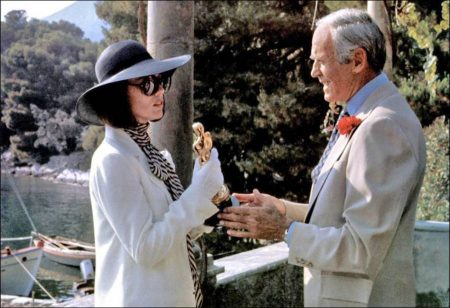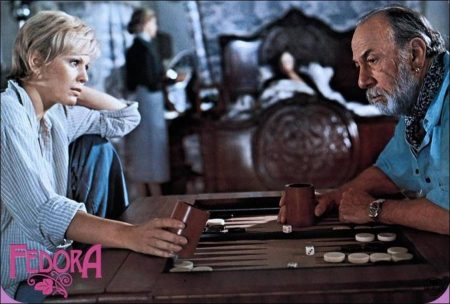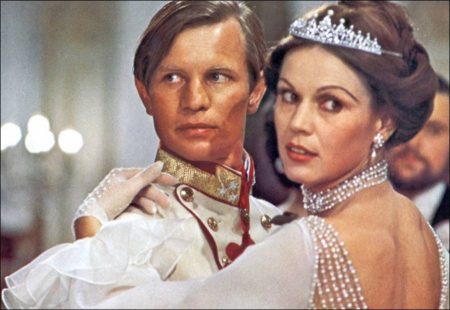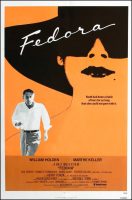Taglines: Youth had been a habit of hers for so long that she could not part with it.
Fedora movie storyline. One of the great movie stars of the century, the reclusive foreign-born Fedora, is known in Hollywood for inexplicably retaining her youthful beauty over the course of a career spanning decades: she looked no older in her first film than she did in her final one. At the height of her fame, however, Fedora withdrew to a private island near Corfu and refused to be seen in public, leading to vast speculation on what became of her. All are shocked when it is confirmed that Fedora has committed suicide by throwing herself in front of a train.
One of her mourners at her funeral is aging has-been Hollywood producer Barry “Dutch” Detweiler, who was once Fedora’s lover. Dutch recalls visiting Fedora two weeks before her death at her villa near Corfu in order to convince her to come out of retirement for a new screen adaptation of Anna Karenina. Dutch is suspicious when Fedora seems confused, disheveled, and unable to remember details of their love affair.
Fedora tells him she is a prisoner on the island, held captive by the elderly Polish Countess Sobryanski, her overprotective servant Miss Balfour, her chauffeur Kritos, and Dr. Vando, who seemingly was responsible for keeping the one-time star looking so young. Dutch attempts to help Fedora flee the island, only to be knocked unconscious by Kritos. He awakens a week later to discover that Fedora has killed herself. Dutch suspects that she might have been murdered by the countess for revealing that she was being held captive.
Fedora is a 1978 West German-French drama film directed by Billy Wilder. The screenplay by Wilder and I.A.L. Diamond is based on a novella by Tom Tryon included in his collection Crowned Heads, published in 1976. The film stars William Holden, Marthe Keller, Hildegard Knef, José Ferrer, Frances Sternhagen, Stephen Collins, Gottfried John, Arlene Francis, Mario Adorf, Michael York and Henry Fonda.
About the Production
Wilder’s The Front Page had been released four years earlier, and had been a critical failure. Furthermore, two more recent Hollywood-based films, Gable and Lombard and W.C. Fields and Me (both released in 1976), had failed to engender any interest at the box office. As a result, executives at Universal Pictures were hesitant to offer Wilder his usual deal.
Instead, they paid Wilder and Diamond to write the screenplay with the understanding the studio had 45 days following its submission to decide if it wanted to proceed with the project. The studio ultimately put it in turnaround, and Wilder began shopping it to other studios with no success. An infusion of capital from German investors enabled him to proceed with the film.
Wilder originally envisioned Marlene Dietrich as Fedora and Faye Dunaway as her daughter Antonia, but Dietrich despised the original book and thought the screenplay was no improvement. Sydney Pollack invited Wilder to a pre-release screening of Bobby Deerfield, in which former fashion model Marthe Keller had a featured role. Wilder decided to cast her as both mother and daughter in Fedora, but the actress had suffered such severe facial nerve injuries in an automobile accident that she was unable to endure wearing the heavy makeup required to transform her into the older character, so he cast Hildegard Knef in the role.
After viewing a rough cut of the film, Wilder realized to his horror that neither Keller nor Knef could be understood easily, nor did their voices sound very much alike, which was crucial to the film’s plot. He hired German actress Inga Bunsch to dub the dialogue of both women for the film’s English-language release. Keller eventually recorded the voices for both characters in the French version, and Knef did likewise for the German release.
Filming took place at the Bavaria Studios in Munich and the Billancourt Studios in Paris with extensive location shooting around Corfu and the smaller island of Madouri. The film’s sets were designed by the art director Alexandre Trauner, who had previously worked with Wilder on Kiss Me, Stupid and The Private Life of Sherlock Holmes.
Allied Artists dropped its deal to distribute the film after it was screened at a Myasthenia Gravis Foundation benefit in New York City and the audience response was unenthusiastic. The film was picked up by Lorimar Productions, which planned to peddle it to CBS as a television movie. Before the network could agree to the offer, United Artists stepped in. After cutting 12 minutes of the film based on studio recommendations, Wilder previewed the film in Santa Barbara, California. Halfway through it the audience began derisively laughing at all the wrong places. Dejected by the response and despondent from all the problems he had encountered up to this point, the director refused to make any more edits.
On May 30, 1978, the film had its world premiere at the Cannes Film Festival as part of a retrospective of the director’s work. Afterward, it was released in only a handful of select American and European markets with little fanfare, prompting an insulted Wilder to claim the studio spent “about $625 on a marketing campaign.” It was later shown as part of the Cannes Classics section of the 2013 Cannes Film Festival.
Both Henry Fonda and Michael York make appearances as themselves, although Fonda is only credited as “The President of the Academy.” In the film, Fonda is the president of the Academy of Motion Picture Arts and Sciences who presents a lifetime achievement award to Fedora, but he never actually served as AMPAS president.
Fedora was a re-teaming of Wilder with Holden, who had collaborated on Sunset Boulevard, and like the earlier film, it harshly criticized Hollywood’s often shabby treatment of its most prominent talent. However, unlike Sunset Boulevard, what Fedora attacked was Hollywood’s youth-oriented culture, not the apparent disposability of perceived has-beens.
Fedora (1978)
Directed by: Billy Wilder
Starring: William Holden, Marthe Keller, Hildegard Knef, José Ferrer, Frances Sternhagen, Stephen Collins, Gottfried John, Arlene Francis, Mario Adorf, Michael York, Henry Fonda
Screenplay by: Billy Wilder
Production Design by: Alexandre Trauner
Cinematography by: Gerry Fisher
Film Editing by: Stefan Arnsten
Costume Design by: Charlotte Flemming
Art Direction by: Robert André
Music by: Miklós Rózsa
MPAA Rating: None.
Distributed by: United Artists
Release Date: June 29, 1978
Views: 191



